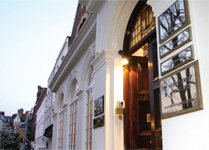One of the world’s oldest Jesuit institutions, Heythrop College in London, is preparing to celebrate four centuries of life next year. Church historian Michael Walsh traces its distinguished history
Heythrop College opened its doors in the autumn of 1970 as part of London University. Presiding over it as the college’s new – strictly speaking, first – principal was Fr Frederick Copleston. He had been appointed to the post not because of his administrative ability but because, as he disarmingly remarks in his Memoirs of a Philosopher, “within a limited academic field my name was known as a writer on philosophical topics”. As author of the nine volumes of what is probably the best-known and most widely admired history of philosophy in English, his descrip
26 October 2013, The Tablet
To the greater glory
Tablet Education
Get Instant Access
Continue Reading
Register for free to read this article in full
Subscribe for unlimited access
From just £30 quarterly
Complete access to all Tablet website content including all premium content.
The full weekly edition in print and digital including our 179 years archive.
PDF version to view on iPad, iPhone or computer.
Already a subscriber? Login





User Comments (12)
Come on Jim McCrea, we know our Savour instructed us to love our enemies. I cannot recollect that Christ told us to ridicule them.
Mike: you sound like your namesake in San Francisco:
Salvatore Cordileone.
btw ... that's NOT a compliment!
you may think the church behind the times, but the church promulgates eternal values; the current state of the position of women is deplorable - they are not serving as wives, companions, true mothers or true women; the tims has come to repudiate feminism, and rebuild family life.
I believe that the Spirit works in respect of the foundation of religious communities/families, each with their distinctive charisms. I equally believe that when a religious society or congregation dies that too can be the Spirit at work. Thankfully religious life continues to flourish in other parts of the world.
Meanwhile, I repeat again that is no such reality as a UK Catholic Church. There are national churches in Ireland, Scotland and England and Wales, each with its own special charism.
Sorry Cleophas, I didn't realise I'd have to use such simple and basic terms to get a point across.
There is a difference between 'declining' and 'in decline'.
Have the Benedictines, Franciscans, Carmelites and Dominicans dropped the habit?
Actually, some of them have.
I presume you realise that those orders are not all monolithic but are made up of many different orders within orders.
And guess what; it's the 'trendy' ones that are in decline.
I am not sure where mikethelionheart gets his statistics. It is not a church I recognise. Traditional orders - Benedictines, Francisans, Carmelites, Dominicans, most Missionary orders? All in decline. Or perhaps he calls these dreadful ’trendy’ groups too.
The SND are one of the dreadful 'trendy' groups who dropped the habit.
These orders are virtually all declining at an incredible rate.
Good.
They became so diluted and watered down they are as bland as the rest of the trendy lot.
The traditional orders are booming.
The future is healthy.
I think this diagnosis is wrong in some respects, actually.
It may be that now there is less scope for orders which carry out works such as nursing as, after all, women can be nurses without needing to be nuns these days.
However, strong contemplative orders do still have a role and are attracting vocations - there is a successful recent foundation of a house of Dominican sisters in the New Forest, for instance, or the Tyburn convents which are thriving, and both strongly contemplative and more pastoral male houses such as the Premonstratensians in Chelmsford and the Oratories in Birmingham and Oxford have plentiful vocations. The traditionalist institutes appear to be flourishing on the continent, especially in France.
More traditional religious life, whether contemplative or pastoral, is not going to disappear. This is a good thing, as these vocations are vital to the Church (it is essential that there are communities of a permanent cycle of prayer and the more pastoral institutes plug the vocations gap when it comes to the lack of secular priests such as is now happening in the north of England with the ICKSP).
Those institutes that are having problems are perhaps doing so because they do not offer a clear identity to potential entrants. If they wish to survive, they should think about this. Some are no longer viable, but some can still save themselves.
I am surprised by the comment by 'Bluepoles' that 'The contemplative orders aren't necessary for the wellbeing of the Church'. Surely their contemplative and intercessory prayer enriches us all. I for one have cause to be profoundly grateful to two communities of contemplative monks which I visited, as encountering their quiet witness set me on the path to joining the Catholic Church. And as for such orders being insulated from what Bluepoles calls 'real life', I would suggest that, on the contrary, their attentiveness to God helps us all to see more clearly what 'real life' might be like.
The questions are good. Some of the answers are really, really wrong. The contempletative orders aren't necessary for the wellbeing of the Church. They may be essential for those who choose to live like this but the Church is rooted in family life and not in celibates who are protected from reality, by the wealth and property they have accumulated from the community, and their isolation from real life since they were recruited, in most cases, as children.
Families have no where to go to ask for money as these orders do, and have done so, especially in hospitals and nursing homes, where there are many stories of religious managing to wrangle the assets from the dying which should have gone to familiy members.
Families have always been dealing with those damaged by wars, the elderly, the disabled, the mentally ill, those escaping domestic violence, and the many other life challenge that come. Only recently have the religious found out about the issues that ageing and a drying up of access to funds can bring. However there seems to be no shortage of them at the Papal events in Rome, World Youth Day and the many, many events that most families can't even dream of attending. And as for holidays! Well there is a whole can of worms with the religious orders owning prime holiday places for their own exclusive use and these are never available to families, especially the poor, who are in every parish. Just ask your local SVdP
Places like Heythorp should close as it's out of touch.
My daughters' generation is almost lost. If my grandchildren's generation is not to be completely lost, Pope Francis needs to get his skates on. Saying the same old things in less harsh ways, two steps forward, one and seven eighths steps back, doesn't really cut it. Jesus met people where they were. The Catholic Church is currently centuries behind.
Sell the convents and give the money to secular organisations where so many Christians are doing so much good.
Part 2
"The growth of lay involvement in recent years has been great, though not always accepted as valid by a certain out-of-date clericalism that is a hangover from earlier times."
Those to whom the first third of that sentence relates are to be admired for their doggedness. For the majority, the remainder of the sentence says it all.
Forty-five years ago, as I entered adulthood, I was drawn to neither teaching nor nursing and I wasn't blessed with domestic gifts, pretty much all that was acceptable (I won't say valued) by “the Church” at that time. So all of my contributing to the well-being of society has been and continues to be in the secular sphere where my skills and I are not only welcomed but valued.
For the next generation, well-educated women like my daughters, “the Church” is simply an anachronism. My daughters were in fact quite enthusiastic about the Church as they experienced it within their schools that were run by progressive, outward looking nuns. But the “Sunday church” that they met, the one weighed down by the heavy hand of a backwards looking hierarchy, had nothing to offer them and, nothing having changed since my school-leaving days (Vatican II basically gathering dust), they had nothing to offer that “the Church” valued. They didn't see themselves barefoot and pregnant, not venturing outside the home, being “admired” for raising a family. Nor does being told how disordered she is, in the case of my gay daughter, go over well.
Part 1